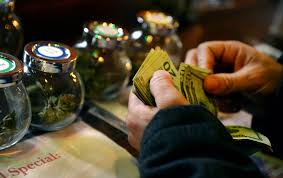
With the repeal of cannabis prohibition rising higher and higher in the national consciousness, it seems like a good time to assess the economic impact of a change. The figure of $180,000,000 per year has been touted as the potential savings from a repeal, but how much tax revenue would it bring in?
The paper linked above suggests that the figure ought to be around $150,000,000 per year, but an argument can easily be made that it ought to be more.
In the first ten months of 2016, Colorado sold over USD1,100,000,000 of cannabis. This figure was so high that the total tax receipts for 2016 on cannabis sales in Colorado look set to be more than those for 2014 and 2015 combined.
USD1,100,000,000 over ten months works out to USD1,320,000,000 over twelve months or NZD1,830,000,000 at the current exchange rate. Colorado has a population of 5,400,000 compared to New Zealand’s 4,700,000, which means that New Zealand is 87% as populous as Colorado. Assuming that the total cannabis sales per person is equivalent in New Zealand and Colorado, we can assume from this that the market in New Zealand would be 87% of the Colorado one, or $1,592,100,000 per year.
Rounding this to $1.6 billion, we come to the figure of about $340 per person per annum. Hardened stoners might scoff at this figure, as it represents about one ounce per year, and New Zealand very likely has more hardened stoners than Colorado, but let’s assume this represents a conservative lower figure.
Simply taking 15% GST on this volume gives us $240,000,000 per year. So it’s fair to say that the $150,000,000 touted above is a very, very conservative figure.
This figure of $240 million is assuming that cannabis is not subject to some kind of vice tax in the way that alcohol and tobacco are. In Washington, the State Government took a 40% cut of the total sales.
The Washington market is not as well developed or planned as the Colorado one, and is thus much smaller. But if the New Zealand market developed like Colorado, a 40% tax would (even allowing for a 10% reduction in total sales on account of the tax) reap $500,000,000 per annum.
The likelihood is that someone on the Government side will end up making the argument that legal cannabis will reduce legal alcohol sales and thus alcohol tax income, and therefore a vice tax will have to be placed on legal cannabis to make up for the shortfall.
The majority of the country will find this logic entirely reasonable, which is in fact regrettable but this is outside the scope of this article. It will probably get pushed through.
In any case, the chances of a cannabis tax up to or even exceeding Washington’s 40% are very real, as New Zealand has a lot more inbred, out-of-touch, sanctimonious wowsers than Washington.
Realistically, then, we could count on tax money from a mature legal recreational cannabis market bringing in half a billion to Government coffers every year. This figure would be considerably higher if we did so now and got the jump on Australia, as there are legions of Aussies who would happily fly a few hours to New Zealand for a weed holiday.

I’m afraid, but don’t REALLY know if we have more sanctimonious conservative narrow-minded power drunks in our politics than the USA, but it sure seems like it! There seems to be a cartel fuelled by a ‘NO’ agenda (no matter WHAT logic is real) headed by people like Dunne, English, Coleman etc, makeing the fight even MORE difficult – but not impossible!